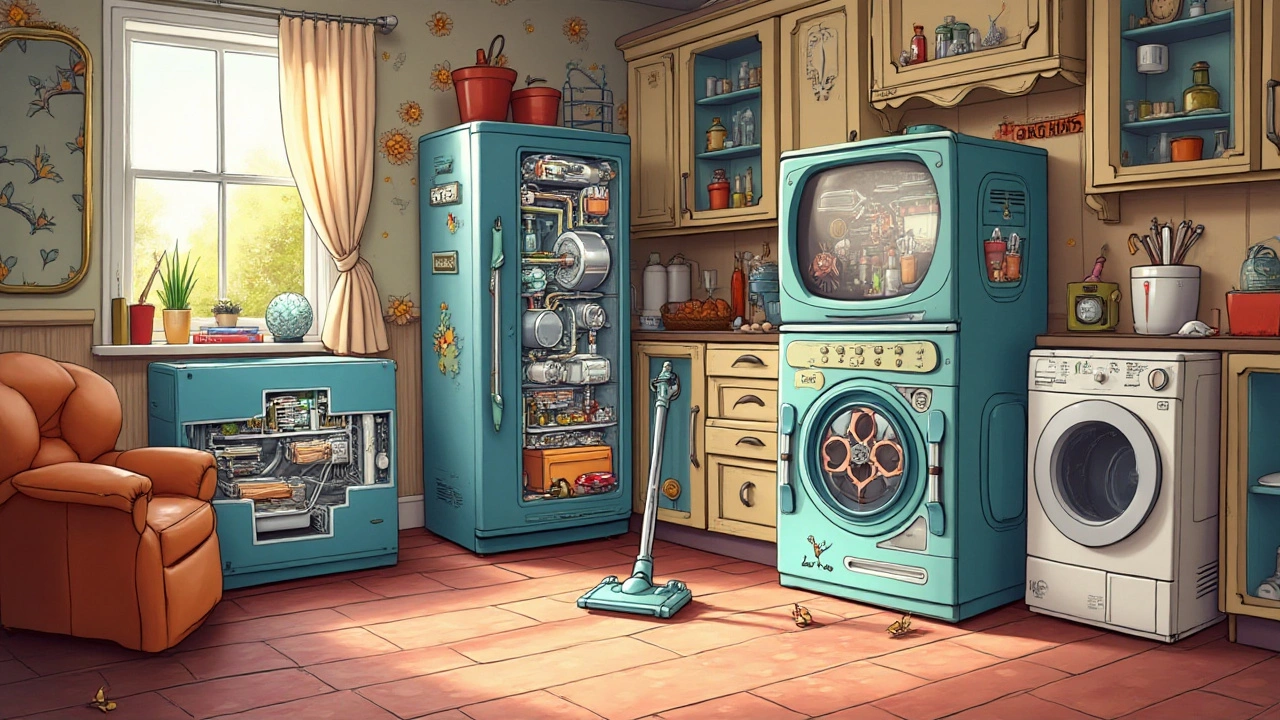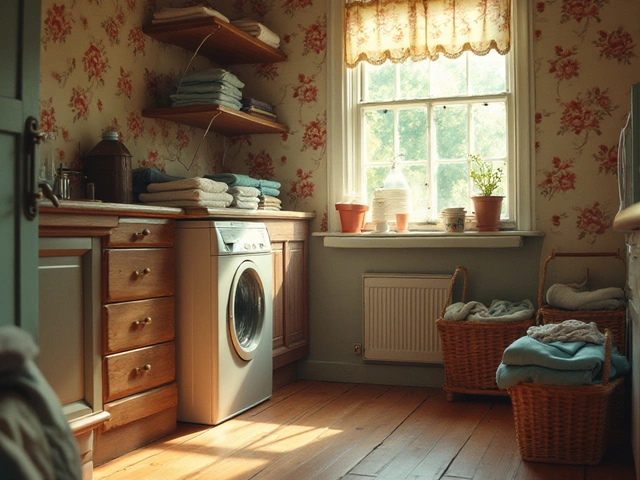In every corner of our homes, trusted appliances stand ready to lend a hand. They churn out meals, clean our clothes, and even entertain us, seamlessly blending into the fabric of daily life. But beyond their practical roles, have you ever wondered what truly makes them tick?
This article aims to shed light on the mystery behind these everyday helpers. From diving into their primary functions to uncovering lesser-known facts, we aim to equip you with knowledge that goes beyond the manual. We'll offer handy tips to extend the life of your devices and guide you in deciding when expert help is necessary. So, let's explore the fascinating world of household appliances and learn how to keep them at their best.
- Understanding Appliance Functions
- Surprising Appliance Facts
- Maintenance Tips for Longevity
- When to Call a Professional
- The Future of Smart Appliances
Understanding Appliance Functions
Appliances in our homes serve as silent workers, weaving convenience into the very fabric of everyday life. Yet, how often do we stop to consider the intricate machinations behind their glossy exteriors? Each appliance, from the humble toaster to the sophisticated refrigerator, operates on principles that blend mechanical design with modern technology. Take, for instance, the refrigerator - it isn't just a cold box but a marvel of thermodynamics, where the vapor-compression cycle plays the hero, maintaining perfect temperatures to keep your groceries fresh. By drawing heat away from the fridge's interior and expelling it outside, it cleverly reverses natural heat flow, keeping your ice cream frozen in the dead of summer. Similarly, consider your washing machine. It may seem like a simple swirling of water and clothes, but it's a calibrated dance of motions: soaking, agitating, washing, rinsing, and spinning, all harmonized through microchips to achieve that spotless clean every time.
Understanding each appliance's core function not only satiates curiosity but also allows for better care and maintenance. You may be surprised to learn that half of appliance service requests arise from simple misunderstandings about these functions. The dishwasher, often unfairly blamed for leaving a spot or two on glasses, is designed to work efficiently with the hottest water possible and periodic cleaning. Did you know that adding rinse aid doesn't just prevent water spots but also helps the drying process by reducing surface tension? Speaking of dishwashers, it's interesting to note how sensors have revolutionized their operation. Modern dishwashers use sensors to gauge dirt levels, adjusting cycles and water volume for optimal cleaning, a feature rooted in a relentless pursuit of both brilliance and sustainability. Even your vacuum cleaner has evolved from a basic dirt collector to a smart navigator of home topography, all thanks to advances in robotics and AI technology.
Going beyond the technical specifications, an intrinsic delight lies in discovering quirky appliance functionalities. Did you ever realize your microwave heats food through radiation at a precise frequency that vibrates water molecules, producing heat? Or that an oven's convection setting, often overlooked, can significantly reduce baking times by circulating hot air and creating an even temperature distribution? Such insights not only broaden appreciation but also help troubleshoot minor glitches that seem to crop up at the most inconvenient times. In fact, a better grasp of these functionalities can significantly reduce calls to appliance service centers. Maintenance becomes much simpler when you understand that cleaning a dryer's lint filter not only improves performance but is also a vital safety precaution. Think of it as knowing your appliances' languages: the gentle hum, the steady beep, the slight vibration—each telling part of a tale, a cycle, a process they have mastered over years.
As fascinating as these devices are, appliances are not immune to narratives and anecdotes. Many have origins rooted in ingenuity. For example, the vacuum cleaner emerged not from a laboratory but as a pragmatic device from Hubert Cecil Booth, after observing an inefficient method of removing dust with bellows. Such stories enrich our understanding and intertwine humanity with technology. The evolution of home appliances is a testament to human inventive spirit, adapting to the times and improving our lives with every iteration. Remember, every beep your appliance makes, every cycle it completes, represents a complex orchestration aimed at easing your daily burden. Maintaining this harmony requires not only a basic understanding but also practical care, ensuring your appliances continue to serve faithfully for years to come.
Surprising Appliance Facts
The world of home appliances is full of quirky tales and fascinating tidbits, some so astonishing they might even make Whiskers raise an eyebrow. Did you know that in the early years of the 20th century, electric appliances were a rather novel concept? One of the first household tools to hit the market was the vacuum cleaner. Unlike the compact models we drag around today, these pioneering machines were anything but portable. They had to be drawn by horses and stationed outside homes, with long hoses snaking their way indoors through open windows. Imagine the spectacle and the neighborhood chatter as these contraptions worked their magic on dusty carpets!
Fast forward to the present day, and appliances like microwaves have transformed how we whip up quick meals. Initially, the microwave was an accidental discovery made when a Raytheon engineer named Percy Spencer noticed a melted candy bar in his pocket while working with radar technology. Today, it's a staple in kitchens worldwide. But here's a fun fact—did you know that in addition to heating leftovers, your microwave can also be used to disinfect kitchen sponges? Simply dampen the sponge, place it in the microwave for a minute, and you'll zap away a vast amount of bacteria. Beware, though, as putting metal objects in a microwave can lead to some unwanted sparks and fireworks!
Refrigerators, our trusty keepers of freshness, have a history as cool as the temperatures they maintain. In the late 1800s, refrigerators were the size of small rooms and relied on ice harvesting from natural sources! It wasn't until after WWII that the modern electric fridge became a domestic staple. Now, smart fridges with touch screens and internet connectivity can tell you when you're running low on eggs or milk. According to a recent survey, over 50% of homes in urban areas have at least one smart appliance, speaking volumes for how these technologies are swiftly becoming mainstream. The data doesn't lie—these smart marvels are here to stay.
"Smart technology in home appliances is not just about convenience but also about improving efficiency and reducing waste," says a renowned consumer electronics expert from a top-rated tech magazine.
Washers and dryers, too, have fascinating backgrounds. The first electric clothes washer was introduced by Hurley Machine Company in 1908. Dubbed 'Thor,' it was a drum-type machine with a galvanized tub that could wash clothes mechanically. Today, advanced models might offer dozens of washing cycles, tailor-made to the fabric's individual needs. Surprisingly, many people aren't aware that regularly overloading their machines can not only affect washing performance but can lead to premature wear and tear. By following manufacturer guidelines regarding load size, you can extend the life of these essential appliance service helpers.
Even seemingly simple household gadgets like the toaster have captivating histories. The first electric toaster was invented in Scotland in 1893 by Crompton & Company, but they became truly popular in the 1920s following the invention of sliced bread. Toasters have since evolved into multifunction marvels capable of toasting anything from Pop-Tarts to artisanal breads. Yet, amidst the evolution, the basic principle remains unchanged—turn bread into a crisp, golden delight that we all enjoy. And as we marvel at these effective machines, let's remember they do more than just serve—they surprise and inspire.

Maintenance Tips for Longevity
Picture this: it's a busy morning and you only have minutes to spare. Suddenly, your trusty dishwasher decides to add an unexpected twist to your schedule by refusing to run. That's when you appreciate the importance of regular maintenance for your beloved home appliances. These everyday assistants, whether it's the fridge keeping your groceries fresh or the washing machine tackling stubborn stains, thrive on a little TLC. Maintaining them isn't only about preventing mishaps but it's also about saving money and energy in the long haul. A simple step to boost the lifespan of your home appliances is regular cleaning. Dishwashers benefit greatly from monthly cleaning with a vinegar cleanse, breaking down any grease build-up. Meanwhile, a vacuum cleaner's filter should be addressed after every few uses, ensuring it's free from dust that could hamper performance.
Diving deeper, refrigerators, the silent beat keepers of our kitchens, demand attention as well. A crucial yet often overlooked aspect is the condenser coils that help maintain the right temperature. Dust accumulation here can make a fridge work harder, affecting both efficiency and lifespan. Voila, a simple brush or a vacuum can solve this issue. You wouldn't leave your car unattended for years without servicing, right? Similarly, regular appliance service checks for personal appliances can safeguard against any brewing troubles. Not to forget, always placing heavier loads in washing machines can wear them out faster than regular weights. Speaking of general stress including energy efficiency, Energy Star suggests that optimized appliances could cut energy costs by up to 30%. In this way, taking advantage of proper care techniques not only bolsters performance but can visibly reduce your utility bills.
"Preventive maintenance is the best insurance you can buy for home appliances," advises Energy Star’s expert, Mark Williams.
Let's shift gears slightly to ovens or cooktops, those culinary wizards that produce spectacular meals. Ensuring their longevity involves keeping them free from residue or spills. Savor the smell of your favorite roast without fearing a potential hazard in caught-on spills igniting. Regularly check seals and knobs for any wear and tear as these seemingly minor aspects can affect energy efficiency in a big way. Perhaps it’s time to inspect other power gobblers in your home — the HVAC systems, for instance. It's well worth the effort to switch out air filters each month, and don't forget to clear away debris from outdoor units. This ensures better airflow and helps stave off unnecessary repairs.
Moreover, conducting a semi-annual audit of your appliance's performance can be a game-changer. Take note of any unusual noises, operational hiccups, or extended cycle times in appliances such as washers or dryers and take action promptly. Another nifty trick is to use a surge protector for appliances like microwaves and televisions, buffering them from the unexpected jolts caused by power outbursts. No one wants to scramble for appliance service when things go haywire, so prevention plays key. The household gadgets we often take for granted toll hours every day to make our lives more comfortable. Much like a well-tended garden, they thrive under regular care, grasping the opportunity to extend their life service remarkably. Watch close, time flies, but maintenance ensures that our appliances don’t age before their time!
When to Call a Professional
There's a certain confidence in being your own handyman, reaching under the sink or into the guts of your washing machine to tackle whatever's unfashionably dripping or groaning. However, a truly wise homeowner knows when to set aside the wrench, pick up the phone, and call in reinforcements. Some appliance issues, while seemingly simple on the surface, require the expertise and specialized tools that only professionals bring to the table. Knowing when to call a professional can save both your sanity and the lifespan of your favorite home appliances.
One of the first cues to call a pro is safety-related. Let's face it, the combination of electricity, water, and in some cases natural gas with household appliances can present a minefield of hazards. If you're dealing with things like a gas range or electric water heater, the stakes are particularly high. For instance, a faulty gas stove can lead to carbon monoxide poisoning, a risk not worth taking. Similarly, if your electrical appliance gives you a noticeable shock, it should be immediately turned off and inspected by an expert. Safety, then, is always paramount, and if your instincts are even tinged with caution, it's time to let the professionals handle it.
Additionally, appliance maintenance can also play a role in your decision. Regular inspections by professionals extend the life span of your devices, keeping malfunctions at bay. It’s like a car getting a regular service check. For example, did you know that a common cause of refrigerator breakdowns is dirty condenser coils? Without the proper cleaning every six months, your fridge must work harder, leading to potential breakdowns and higher energy bills. A professional technician will perform such maintenance tasks thoroughly, ensuring that your appliances remain energy-efficient and reliable.
“An ounce of prevention is worth a pound of cure,” states the old adage, which holds especially true in appliance maintenance. Avoiding professional service periodically could lead to much larger repair bills down the road and premature replacement of costly home gadgets.
It can be tempting to dismiss strange noises or excessive vibrations as temporary hiccups, but these often signify more significant underlying issues that might be escalating quietly. For example, an unusually noisy dryer might be hinting at a worn-out drum bearing or motor, issues that, if neglected, could irreversibly damage your machine and clothes. The same applies to dishwashers that take longer to complete cycles or a freezer that's frosting more than usual. These oddities are often symptoms of bigger, costlier problems if left unchecked, and they warrant professional intervention.
Finally, consider the economics. You might think you're saving money by skirting professional help, but numerous DIY repair attempts end up costing more in the long run. The parts you order online might not fit or function as expected, and without the correct diagnostic tools, you risk damaging components that were never broken to begin with. Thus, professional intervention from the start can ultimately reduce costs, as many appliance service companies offer maintenance plans that include parts and labor at a discounted rate.

The Future of Smart Appliances
Imagine a world where your home appliances hardly need a nudge to accomplish tasks. This is the era we're quickly heading towards, thanks to the rapid advancement of technology in everyday household devices. Smart appliances aren't just a concept of the distant future anymore; they're a part of our daily lives, connecting to the internet, responding to voice commands, and even learning our habits over time. How do they do it? Through the clever integration of AI and machine learning technologies.
For instance, consider a smart refrigerator. Rather than just keeping your food cold, a modern fridge can do much more—it tracks the freshness of your produce, suggests recipes based on available ingredients, and provides energy usage reports. Over time, the refrigerator learns from the user's routines—like identifying the household's common shopping habits or knowing when it's time to make that grocery list. This learning element is where smart appliances truly stand out, offering not just convenience but an enhanced experience that adapts to our lifestyles.
Many companies are taking bold steps in developing and enhancing these smart functionalities. Brands like Samsung and LG are notable for their early adoption of AI in appliances, and they continue to push boundaries. "The future of smart appliances lies in their ability to predict our needs before we even realize them," states a recent tech industry review. This suggests a future where these devices become more intuitive and interconnected, providing a seamless, automated home environment.
Security does play a crucial role in the evolution of smart appliances. With the potential for increased connectivity comes the concern for data protection and privacy. As a result, manufacturers are investing heavily in cybersecurity to safeguard consumer data, giving users peace of mind. This balance between innovation and security defines the current trajectory of the appliance industry as it adapts to a smarter future. We can expect our trusty household devices to continue transforming, with new features being added at a rapid pace, ultimately enhancing our quality of life in unexpected and impressive ways. As technology advances, the only certainty is that these appliances will keep surprising us with their capabilities and seamless integration into our daily routines, making life more streamlined and enjoyable.







